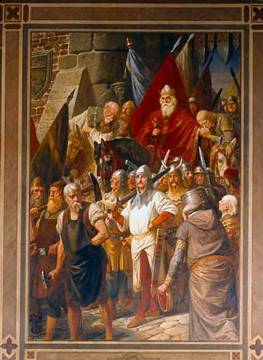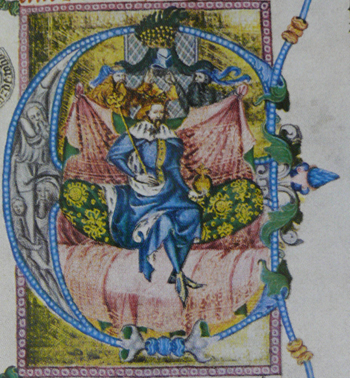|
Philipp I Of Nassau-Weilburg
Count Philipp I of Nassau-Weilburg (1368 – 2 July 1429) was Count of Nassau in Weilburg, Count of Saarbrücken and Seigneur of Commercy ''Château bas'' in 1371–1429. Biography Philipp was a son of John I, Count of Nassau-Weilburg (1309 – 1371) and Johanna, Countess of Saarbrücken (d. 1381), daughter of John II, Count of Saarbrücken (d. 1381). Philipp inherited the County of Nassau-Weilburg from his father in 1371 and the County of Saarbrücken from his mother 1381. For the first ten years, his mother was the regent in his place, then bishop Friedrich of Blankenheim was the regent until his majority. Philipp married twice and had several children, and his first wife Anna brought some territories in Trier that were added to his realm. At Philipps death in 1429, the counties were ruled jointly by his eldest sons, with their mother Elisabeth as regent until 1442, then it was divided between them, Philipp getting Nassau-Weilburg and Johann getting Saarbrücken and Commer ... [...More Info...] [...Related Items...] OR: [Wikipedia] [Google] [Baidu] |
House Of Nassau
The House of Nassau is the name of a European aristocratic dynasty. The name originated with a lordship associated with Nassau Castle, which is located in what is now Nassau, Rhineland-Palatinate, Nassau in Rhineland-Palatinate, Germany. With the fall of the Hohenstaufen dynasty in the first half of the 13th century, royal power within Franconia evaporated and the former stem duchy fragmented into separate independent states. Nassau emerged as one of those independent states as part of the Holy Roman Empire. The lords of Nassau were originally titled "Counts of Nassau", subject only to the Holy Roman Emperor, Emperor, and then elevated to princely rank as "Princely Counts". Early on, the family divided into two main branches – the elder (Walramian) branch, which gave rise to the German king Adolf, King of the Romans, Adolf, and the younger (Ottonian) branch, which gave rise to the Prince of Orange, Princes of Orange and the King of the Netherlands, monarchs of the Netherlands. ... [...More Info...] [...Related Items...] OR: [Wikipedia] [Google] [Baidu] |
Johann II Of Nassau-Saarbrücken
Johann, typically a male given name, is the German form of ''Iohannes'', which is the Latin form of the Greek name ''Iōánnēs'' (), itself derived from Hebrew name '' Yochanan'' () in turn from its extended form (), meaning "Yahweh is Gracious" or "Yahweh is Merciful". Its English language equivalent is John. It is uncommon as a surname. People People with the name Johann include: Mononym * Johann, Count of Cleves (died 1368), nobleman of the Holy Roman Empire *Johann, Count of Leiningen-Dagsburg-Falkenburg (1662–1698), German nobleman *Johann, Prince of Hohenzollern-Sigmaringen (1578–1638), German nobleman A–K * Johann Adam Hiller (1728–1804), German composer * Johann Adam Reincken (1643–1722), Dutch/German organist * Johann Adam Remele (died 1740), German court painter * Johann Adolf I, Duke of Saxe-Weissenfels (1649–1697) * Johann Adolph Hasse (1699-1783), German Composer * Johann Altfuldisch (1911—1947), German Nazi SS concentration camp officer executed fo ... [...More Info...] [...Related Items...] OR: [Wikipedia] [Google] [Baidu] |
Luxembourg
Luxembourg, officially the Grand Duchy of Luxembourg, is a landlocked country in Western Europe. It is bordered by Belgium to the west and north, Germany to the east, and France on the south. Its capital and most populous city, Luxembourg City, is one of the four institutional seats of the European Union and hosts several EU institutions, notably the Court of Justice of the European Union, the highest judicial authority in the EU. As part of the Low Countries, Luxembourg has close historic, political, and cultural ties to Belgium and the Netherlands. Luxembourg's culture, people, and languages are greatly influenced by France and Germany: Luxembourgish, a Germanic language, is the only recognized national language of the Luxembourgish people and of the Grand Duchy of Luxembourg; French is the sole language for legislation; and both languages along with German are used for administrative matters. With an area of , Luxembourg is Europe's seventh-smallest count ... [...More Info...] [...Related Items...] OR: [Wikipedia] [Google] [Baidu] |
Sigismund, Holy Roman Emperor
Sigismund of Luxembourg (15 February 1368 – 9 December 1437) was Holy Roman Emperor from 1433 until his death in 1437. He was elected King of Germany (King of the Romans) in 1410, and was also King of Bohemia from 1419, as well as prince-elector of Margraviate of Brandenburg, Brandenburg (1378–1388 and 1411–1415). As the husband of Mary, Queen of Hungary, he was also King of Hungary and Croatia in union with Hungary, Croatia (''jure uxoris'') from 1387. He was the last male member of the House of Luxembourg. Sigismund was the son of Charles IV, Holy Roman Emperor and his fourth wife Elizabeth of Pomerania. He married Mary, Queen of Hungary in 1385 and was crowned King of Hungary soon after. He fought to restore and maintain authority to the throne. Mary died in 1395, leaving Sigismund the sole ruler of Kingdom of Hungary, Hungary. In 1396, Sigismund led the Battle of Nicopolis, Crusade of Nicopolis but was decisively defeated by the Ottoman Empire. Afterwards, he founded t ... [...More Info...] [...Related Items...] OR: [Wikipedia] [Google] [Baidu] |
Rupert, King Of Germany
Rupert of the Palatinate (; 5 May 1352 – 18 May 1410), sometimes known as Robert of the Palatinate, a member of the House of Wittelsbach, was Elector Palatine from 1398 (as Rupert III) and King of Germany from 1400 until his death. Early life Rupert was born at Amberg in the Upper Palatinate, the son of Elector Palatine Rupert II and Beatrice of Aragon, daughter of King Peter II of Sicily. Rupert's great-granduncle was the Wittelsbach emperor Louis IV. He was raised at the Dominican Liebenau monastery near Worms, where his widowed grandmother Irmengard of Oettingen lived as a nun. Reign From his early years Rupert took part in the government of the Electoral Palatinate to which he succeeded on his father's death in 1398. He and the three ecclesiastical prince-electors (of Mainz, Cologne and Trier) met at Lahneck Castle in Oberlahnstein on 20 August 1400 and declared their king, Wenceslaus, deposed. On the next day the same four electors met at Rhens to ballot for Ru ... [...More Info...] [...Related Items...] OR: [Wikipedia] [Google] [Baidu] |
Wetterau
The Wetterau (, ) is a fertile undulating tract, watered by the Wetter (river), Wetter, a tributary of the Nidda (river), Nidda River, in the western German state of Hesse, between the hilly province Oberhessen and the north-western Taunus mountains. Bettina von Arnim writes of Wetterau in her text ''Diary of a Child'' in the chapter "Journey to the Wetterau". Geography The Wetterau is located north of Frankfurt am Main, on the eastern side of the Taunus and south-west of the Vogelsberg_Mountains, Vogelsberg. The main part of the region is taken up by the political region Wetteraukreis. The region got its name from the small creek Wetter (river), Wetter, but the region is crossed by several other creeks and rivers - for example, the Nidda (river), Nidda, Nidder, Horloff and Usa (Germany), Usa. History The Wetterau has a long history and is one of the oldest cultural landscapes in Germany. It was always a very fertile region and was populous from as early as the Neolithic Ag ... [...More Info...] [...Related Items...] OR: [Wikipedia] [Google] [Baidu] |
Rhine
The Rhine ( ) is one of the List of rivers of Europe, major rivers in Europe. The river begins in the Swiss canton of Graubünden in the southeastern Swiss Alps. It forms part of the Swiss-Liechtenstein border, then part of the Austria–Switzerland border, Swiss-Austrian border. From Lake Constance downstream, it forms part of the Germany-Switzerland border, Swiss-German border. After that the Rhine defines much of the Franco-German border. It then flows in a mostly northerly direction through the German Rhineland. Finally, the Rhine turns to flow predominantly west to enter the Netherlands, eventually emptying into the North Sea. It drains an area of 185,000 km2. Its name derives from the Gaulish language, Gaulish ''Rēnos''. There are two States of Germany, German states named after the river, North Rhine-Westphalia and Rhineland-Palatinate, in addition to several districts of Germany, districts (e.g. Rhein-Sieg-Kreis, Rhein-Sieg). The departments of France, department ... [...More Info...] [...Related Items...] OR: [Wikipedia] [Google] [Baidu] |
Landfrieden
Under the law of the Holy Roman Empire, a ''Landfrieden'' or ''Landfriede'' (Latin: ''constitutio pacis'', ''pax instituta'' or ''pax jurata'', variously translated as "land peace", or "public peace") was a contractual waiver of the use of legitimate force, by rulers of specified territories, to assert their own legal claims. This especially affected the right of feuding. Scope ''Landfrieden'' agreements formed the political basis for pursuing claims without resorting to the private use of violence. They also often regulated the jurisdiction and thus allowed the settlement of disputes through judgements based on a common set of rules. Offences or violations of the public peace were liable to severe punishment. For example, objects or buildings (such as churches, homes, mills, agricultural implements, bridges, and especially imperial roads) and people (priests, pilgrims, merchants, women, even farmers, hunters and fishermen in carrying out their work) could be placed under pro ... [...More Info...] [...Related Items...] OR: [Wikipedia] [Google] [Baidu] |
Wenceslaus IV Of Bohemia
Wenceslaus IV (also ''Wenceslas''; ; , nicknamed "the Idle"; 26 February 136116 August 1419), also known as Wenceslaus of Luxembourg, was King of Bohemia from 1378 until his death and King of Germany from 1376 until he was deposed in 1400. As he belonged to the House of Luxembourg, he was also Count of Luxembourg, Duke of Luxembourg from 1383 to 1388. Biography Wenceslaus was born in the Free imperial city, Imperial city of Nuremberg, the son of Emperor Charles IV, Holy Roman Emperor, Charles IV by his third wife Anna Svídnická, a scion of the Silesian Piasts, and baptized at St. Sebaldus Church, Nuremberg, St. Sebaldus Church. He was raised by the Prague Archbishops Arnošt of Pardubice and Jan Očko of Vlašim. His father had the two-year-old crowned King of Bohemia in June 1363 and in 1373 also obtained for him the Electoral Margraviate of Brandenburg. When on 10 June 1376 Charles IV asserted Wenceslaus' election as King of the Romans by the prince-electors, t ... [...More Info...] [...Related Items...] OR: [Wikipedia] [Google] [Baidu] |
Accolade
The accolade (also known as dubbing, adoubement, or knighting) () was the central act in the rite of passage Ceremony, ceremonies conferring knighthood in the Middle Ages. Etymology The term ''accolade'' entered English by 1591, when Thomas Lodge used it in a historical romance about Robert the Devil: "He had with all solemnitie the accolade, and was commanded to kneele downe to receiue the order of Knighthoode." It derives from the Middle French ''accolee'', meaning an embrace or the bestowal of knighthood thereby, which in turn descends from the Latin ''collum'', meaning "neck". History Ceremony Accolade ceremonies have taken a variety of forms, including the tapping of the flat side of a knighting sword on the shoulders of a candidate (who is himself sometimes referred to as an accolade during the ceremony) or an embrace about the neck. The earliest reference to the knighting as a formal ceremony in Germany is in the ''Annals of Aachen'' under the year 1184, when the E ... [...More Info...] [...Related Items...] OR: [Wikipedia] [Google] [Baidu] |






